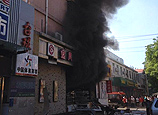
HARBIN, July 24 (Xinhua) -- As dozens of commuters waited at a bus terminal Wednesday, more than 50 buses were outside a natural gas station in Harbin, capital of China's northeastern Heilongjiang Province.
Public transport fell into disarray as over half of the city's 23 natural gas stations -- serving some 3,500 buses and 4,000 taxis running on gas -- closed their doors. It followed a price hike that gas stations were not allowed to pass on to customers.
Gas stations in the city previously bought gas at around 3 yuan (0.49 U.S. dollars) per metric meter and sold it at 3.7 yuan. Now their costs have risen to around 4.2 yuan per metric meter, according to local government documents acquired by Xinhua.
"Retail prices in Harbin remain unchanged. For gas stations, the more they sell, the more they lose. It makes sense for them to stay closed for the moment," said Jia Dongjiang, a Harbin official in charge of fuel management.
Similar scenes have been reported in other places, according to Wang Xiaokun, an analyst at SCI, a Chinese energy information provider.
Despite chaos caused by the price hikes, analysts said it is necessary to keep expanding the use of natural gas, which the National Development and Reform Commission (NDRC) described as "an efficient, clean and low-carbon energy source".
After a national pilot program promoting clean energy started in 2007, Harbin began expanding natural gas use in public transport, equipping its bus fleet with gas tanks instead of oil ones.
Taxis followed suit, as drivers found the alternative to oil more cost-efficient.
According to local cab drivers, they could save 30 cents per kilometer, or over 30 percent of fuel costs, running on natural gas.
The low-cost was kept possible due to China's tight grip on the domestic price of natural gases. This is about to change after the NDRC, China's top economic planner and price regulator, announced price hikes for non-residential natural gas on June 28.
The NDRC spared price hikes for residential use of natural gas, which would directly affect households, particularly those needy people, but high streets are expected to be impacted anyway.
As fuel for running buses and cabs rise, it is only a matter of time before commuters to begin sharing the costs.
 |
















 People hold funeral for deceased relatives in quake-hit region
People hold funeral for deceased relatives in quake-hit region


![]()
